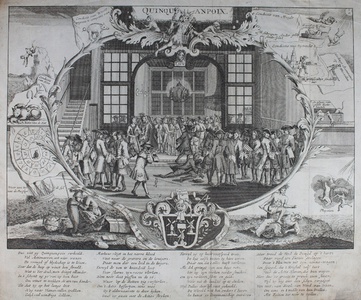| Method | Copper engraving and etching |
| Artist | [Anonymous] |
| Published | [c. 1720] |
| Dimensions | Image 248 x 355 mm, Sheet 325 x 385 mm |
| Notes |
A Dutch satire depicting traders gathered at the coffee house "Quinquenpoix" in Paris. The cafe is named after the street in Paris where John Law established his banque general in 1716, which he would later combine with the Compagnie des Indies, as part of the "Mississippi scheme" or "Mississippi Bubble". The traders speculating on this print seem to be going about business as usual, and are not yet aware that the accumulation of this scheme and their actions will eventually lead to a dramatic crash of the European stock market in 1720. The scene of the crowd trading at the coffee house is framed in an oval border. John Law's head decorates the entrance of the coffee house, above him Mercury, god of merchants and traders, is dressed as a fool. All around references are made to failed investment schemes in Utrecht, Muiden, Harlingen, Weesp and Rotterdam, while the boat on the lower left refers directly to the Mississippi scheme. Icarus is shown falling from the sky, as his hubris let him to fly too close to the sun and his wings have melted away. Another reference to Greek mythology is depicted with Phaethon falling from his father Helios' sun chariot, which he drove for one day, even though his father warned him he would lose control over the horses. To the left, the sleeping cat being jumped on by rats probably related to the Dutch saying "A sleeping cat doesn't catch any rats" (you have to work for your money) while the rats crawling into the chest are accompanied by text saying it contains rat droppings instead of money. Lastly, the allegorical Virtue is being trampled by Envy, to the lower right. Dutch text describing the scene below image. John Law (1671-1729) was a Scottish born economic. He studied in London, but fled the city for Amsterdam after he had fatally injured his adversary in a duel. He continued his studies in Amsterdam, and only ten years after the incident, returned home to Scotland, where he put forth his proposal for a banking reform, which was rejected. He then tried his luck elsewhere en eventually got permission to try the reform in France, where the government was in debt due to Louis XIV's spend drift, and Law had also befriended France's regent, the Duke of Orleans. His theory was that increasing the quantity of money on the market, would stimulate the economy at large. His plan was to found a central bank, which would manufacture bank notes to circulate in large quantities, instead of the rare gold and silver coins which where currently on the market. He founded his Banque Générale (General Bank) in 1716, for this purpose, in Paris, which would eventually lead to him taking over the minting process for the country, as well as the collection of taxes. A year later, he founded the Compagnie d'Occident (Company of the West), initially known as the Louisiana Company and later Compagnie des Indies, with the permission to develop the French territories in Mississippi, which he funded through his bank. Law eventually managed to also monopolise the French trade of African slaves and tabacco, and effectively controlled both the countries colonial trade and finances. The public saw the potential for the profits of Law's endevours in Mississippi, and wanted to buy shares of the Compagnie des Indies. This high demand for the shares, pushed the price of shares up drastically, out of proportion to the companies profits. Law intended to sell his shares in exchange for billets d'etats (state-issued public securities), and as these also rose in value, the European stock market had a sudden boost through the public speculating wildly. The French government responded by demanding more paper money to be printed at a fast rate, eventually resulting in the value of money to sink, as well as the value of Law's company shares and the billets d'etats. At he same time the Comoagnie des Indies did not make as much profit from its colonial ventures as quickly as expected, and because the company and the countries finances where tied, all of this ended in a crash of the stock market in 1720, not only in France, but throughout Europe. Although Law was not entirely responsible for everything that led to this disaster, he had to flee France and died a poor man in Venice. The French government took over the debt of the general bank and Compagnie des Indies and raised taxes to solve it. BM Satires 1649 Condition: Trimmed within plate mark. Pressed centre fold as issued. Overall time toning and surface dirt built up. Crease to bottom right corner. |
| Framing | unmounted |
| Price | £450.00 |
| Stock ID | 47736 |

